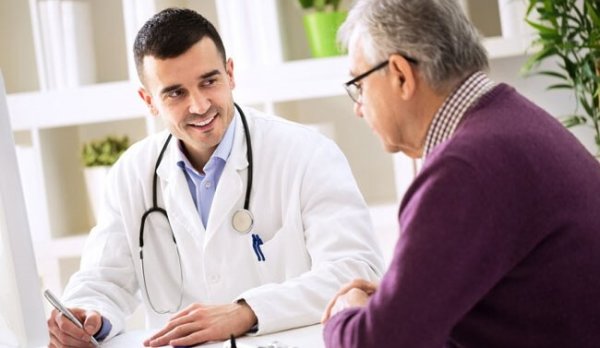Empathy and Oncology


Written and verified by the psychologist Valeria Sabater
Empathetic oncologists are the key to holistic, patient-centered care. There are important elements that can help a patient face the reality of their illness, in addition to the different treatments they might have to receive. Some of these are easy access to health professionals, understanding, and a proper socio-emotional focus.
Getting cancer diagnosis can be devastating. However, it’s important for patients to keep in mind that cancer is still an illness; it’s not the end. Instead, it’s the beginning of a long journey. It marks the beginning of something that will require patients, families, and caregivers alike to give the very best of themselves.
“Once you have faced cancer, everything else seems pretty simple.”
-David H. Koch-
This journey implies two things: dealing with treatments and employing psychological and emotional strategies to handle the difficult day-to-day reality of it. During the process, the relationship between the patient and the healthcare providers is vital and should be a priority. Patients need their doctors to be able to do their absolute best.
When it comes to oncology, empathy is extremely vital. It is the strong bond linking the health professional and the patient. If the doctors lack empathy, they will treat their patients coldly, like a statistic. Needless to say, these attitudes and behaviors can very negatively impact the patients. They’re trapped in the situation, after all.

Communication in oncology
Health professionals are incredible people. We commend their work and dedication to their patients and their health and happiness. However, we also know that not every country has the same luck in this context. Not all governments have implemented good health systems or protocol.
Just to give an example, there are certain skills in Spain that healthcare professionals have been using for years. In contrast, the communication and psycho-emotional skills that are common in Spain are still relatively new in the United States.
There are certainly going to be exceptions, and everything depends on the skill and interest of each healthcare provider. Still, it wasn’t until 2016 that investigators started to do research on the subject.
The goal is to train oncology healthcare professionals in communication skills. Medical skills are not the only essential tools to be taught. Communication skills and emotional psychology are not innate; experts have to train healthcare workers in these skills. They need to get good, specialized training if they are going to work in the delicate and complex field of oncology.

Important skills for communication in oncology
Communication means more than just being a good listener. It means knowing how to respond and intuit the needs of the patient. It also means using the right resources and strategies for each individual patient. All of the above will ensure holistic, quality patient care that goes a lot further than chemo and surgery. Here are 3 key skills.
How to ask questions
Healthcare professionals know that they have to give bad news on a regular basis. They have to diagnose cancer, inform patients about surgery, and break the news that a treatment isn’t working or that an illness is progressing instead of being in remission. It’s not easy, and that’s exactly why healthcare providers need to be well-trained in this type of communication.
On the other hand, simply sharing information is not always enough. Healthcare professionals also have to know how to ask the right questions. They need to see if the patient is understanding the information.
Also, it’s an opportunity to see how the patient is reacting, and what their needs are. With the right questions, the provider can figure out if the patient needs some kind of complementary treatment (like psychological attention, for example.)
Empathy
Doctors, nurses, physicians assistants, etc… All medical professionals, and especially those working in oncology, know that empathy is key. Patients and their families might be stressed, afraid, defensive, and even agnry. Healthcare professionals have to know how to manage all of these emotions.
Shared decision-making models (SDM)
Shared decision-making models are foundational in the arena of oncology and patient care. These models involve patients as much as possible in their own care. That way, patients don’t see their providers as the ultimate authority, making all decisions unilaterally.
In these models, the patient and their family should be involved in every step of the process. They, along with the medical team, make the decisions. In addition, they commit to actively fighting the cancer.
“You can be a victim of cancer, or a surviver of cancer. It’s a mindset.”
-David Pelzer-

In conclusion, communication in oncology should be a top priority for proper, patient-centered care. The exhausting fight to beat cancer is not something that the patient can do on their own. Family and social support are crucial. That, along with high-quality health care is a powerful source of motivation and hope.
Empathetic oncologists are the key to holistic, patient-centered care. There are important elements that can help a patient face the reality of their illness, in addition to the different treatments they might have to receive. Some of these are easy access to health professionals, understanding, and a proper socio-emotional focus.
Getting cancer diagnosis can be devastating. However, it’s important for patients to keep in mind that cancer is still an illness; it’s not the end. Instead, it’s the beginning of a long journey. It marks the beginning of something that will require patients, families, and caregivers alike to give the very best of themselves.
“Once you have faced cancer, everything else seems pretty simple.”
-David H. Koch-
This journey implies two things: dealing with treatments and employing psychological and emotional strategies to handle the difficult day-to-day reality of it. During the process, the relationship between the patient and the healthcare providers is vital and should be a priority. Patients need their doctors to be able to do their absolute best.
When it comes to oncology, empathy is extremely vital. It is the strong bond linking the health professional and the patient. If the doctors lack empathy, they will treat their patients coldly, like a statistic. Needless to say, these attitudes and behaviors can very negatively impact the patients. They’re trapped in the situation, after all.

Communication in oncology
Health professionals are incredible people. We commend their work and dedication to their patients and their health and happiness. However, we also know that not every country has the same luck in this context. Not all governments have implemented good health systems or protocol.
Just to give an example, there are certain skills in Spain that healthcare professionals have been using for years. In contrast, the communication and psycho-emotional skills that are common in Spain are still relatively new in the United States.
There are certainly going to be exceptions, and everything depends on the skill and interest of each healthcare provider. Still, it wasn’t until 2016 that investigators started to do research on the subject.
The goal is to train oncology healthcare professionals in communication skills. Medical skills are not the only essential tools to be taught. Communication skills and emotional psychology are not innate; experts have to train healthcare workers in these skills. They need to get good, specialized training if they are going to work in the delicate and complex field of oncology.

Important skills for communication in oncology
Communication means more than just being a good listener. It means knowing how to respond and intuit the needs of the patient. It also means using the right resources and strategies for each individual patient. All of the above will ensure holistic, quality patient care that goes a lot further than chemo and surgery. Here are 3 key skills.
How to ask questions
Healthcare professionals know that they have to give bad news on a regular basis. They have to diagnose cancer, inform patients about surgery, and break the news that a treatment isn’t working or that an illness is progressing instead of being in remission. It’s not easy, and that’s exactly why healthcare providers need to be well-trained in this type of communication.
On the other hand, simply sharing information is not always enough. Healthcare professionals also have to know how to ask the right questions. They need to see if the patient is understanding the information.
Also, it’s an opportunity to see how the patient is reacting, and what their needs are. With the right questions, the provider can figure out if the patient needs some kind of complementary treatment (like psychological attention, for example.)
Empathy
Doctors, nurses, physicians assistants, etc… All medical professionals, and especially those working in oncology, know that empathy is key. Patients and their families might be stressed, afraid, defensive, and even agnry. Healthcare professionals have to know how to manage all of these emotions.
Shared decision-making models (SDM)
Shared decision-making models are foundational in the arena of oncology and patient care. These models involve patients as much as possible in their own care. That way, patients don’t see their providers as the ultimate authority, making all decisions unilaterally.
In these models, the patient and their family should be involved in every step of the process. They, along with the medical team, make the decisions. In addition, they commit to actively fighting the cancer.
“You can be a victim of cancer, or a surviver of cancer. It’s a mindset.”
-David Pelzer-

In conclusion, communication in oncology should be a top priority for proper, patient-centered care. The exhausting fight to beat cancer is not something that the patient can do on their own. Family and social support are crucial. That, along with high-quality health care is a powerful source of motivation and hope.
This text is provided for informational purposes only and does not replace consultation with a professional. If in doubt, consult your specialist.







